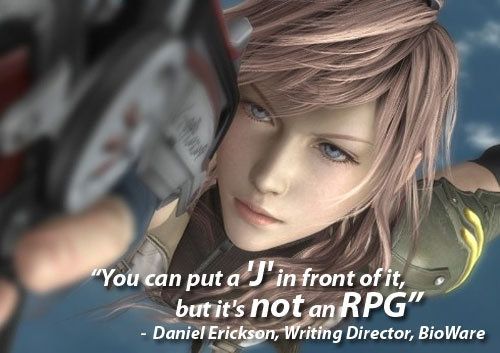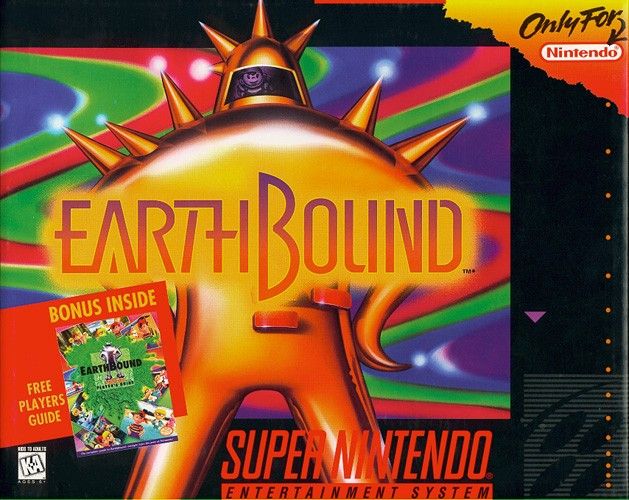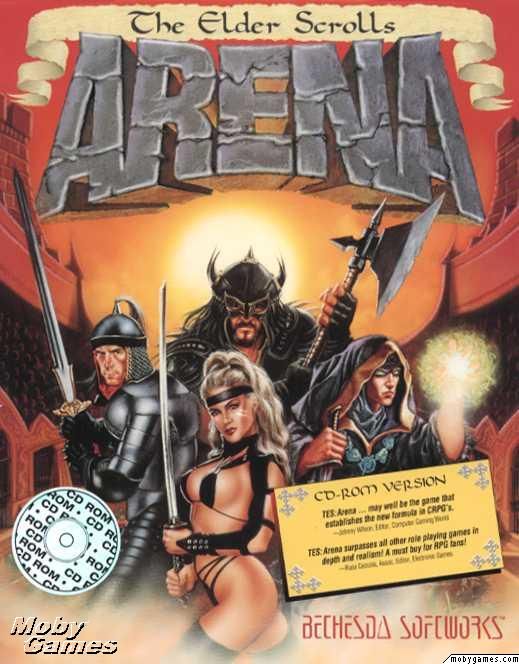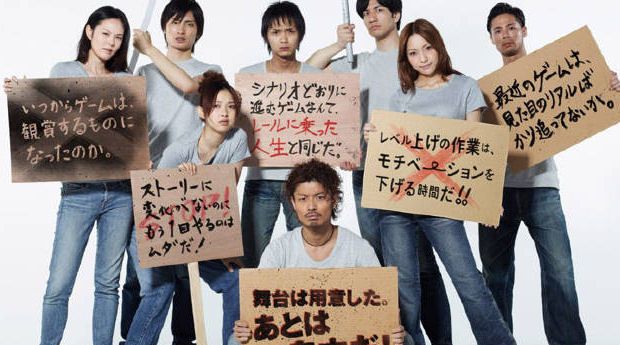The 1990s seem, to many people’s recollection, to be the hay day of Japanese-style RPGs. During that time we saw the release of many games that gamers today feel are some of the best in the genre. The Final Fantasy franchise in particular moved a lot of units and worked its way into a lot of people’s hearts with the move to 3D visuals in Final Fantasy VII. Even with this graphical change, one thing remained the same - no matter how many Final Fantasies or other JRPGs were released, they were still designed from the ground up with a specific philosophy in mind.
They had pre-defined stories and characters, with the developers asking the player to go on a journey with them, to see these characters interact and tell a story themselves. In very few instances did the genre ever deviate from that design philosophy. But, it got to the point where, apparently, gamers wanted more freedom.
At the time, Japanese developers still held a strong arm around the video game industry, especially with their monstrous and visually appealing RPGs. As far as video game RPGs go, during this time period many Western gamers were introduced to the genre. What used to be a niche before that, with previous Final Fantasy titles, Dragon Warrior and other NES-era games, had now blossomed into the 16-bit and 3D era with such master works as Earthbound, Secret of Mana, Chrono Trigger, Final Fantasy VI, VII and so on. If you wanted to play an RPG, you went out and bought one of these, or similar, titles.
While everyone was in this RPG frenzy, unbeknown to most because of their fixation on these Japanese titles, two developers had come onto the scene with a new philosophy in mind for the video game RPG. Both Bethesda and Bioware released the first titles in some of their signature franchises during this time, and they were loved by many, although you could still arguably say that the JRPG was still bigger at this point. In 1994, Bethesda Softworks released The Elder Scrolls: Arena, the first in their long-running and much-loved RPG franchise. Bioware, on the other hand, released the first title in the Baulder’s Gate series a few years later, in 1998. Both of these titles and their subsequent sequels propelled the respective developers into the limelight and ultimately paved the way for a shift in RPG genres early in the 21st century.
These days it seems like Japanese RPGs are criticized for their “traditional” mechanics, laughed at for their anime-style visuals, ripped apart for their complicated stories and often cliché characters and just generally given a hard time all around. They seem to be a punching bag for gamers who dislike the genre’s staples such as character-driven story, cut scenes, linear progression and anime cuteness. Western RPGs came to the forefront with many gamers because of their darker, more classical focus, their creative freedom and their more action-oriented battle philosophy, which stems from that Dungeons & Dragons mindset. So, what changed? Did these two now-giant developers, with their new, different philosophies about what makes a great RPG bring about the downfall of the one-time masters of this domain in video gaming?
Many people who were “born and raised”, so to speak, on JRPGs are now adults with families, jobs and responsibilities. Their children are the ones determining which games are purchased and popular these days. No longer do the parents have time for all their favorite games of the past, if they even still game at all.
Today’s generation of teenagers seem to have the mentality that fits more action-style combat the best – the impatient and “must have now” attitudes permeate the landscape when it comes to those playing the bulk of the games. Japanese RPGs are known for their hefty game play times, their slower, more formulaic and strategic battle systems and tons and tons of dialog through cut scenes. People seem to not want that anymore.
Why is that? We could blame this generation gap, and the change in attitudes of the bulk of gamers. Or, we could blame the shooters, which many of the Western RPGs of today base their game play off of. Someone got it into their minds that they could bring a shooter-style battle system into an RPG and people would come to it in droves. Even before that, generally “all action all the time” in a real-time manner was what drew these “must have it now” players to Western RPGs.
As we moved into the new century, Japanese RPG sales declined overall. As the visual power of consoles improved, Western RPGs with their more realistic, gritty art style prospered. No longer did people want to wait around in a turn-based battle or sit through countless cut scenes, regardless of the fact that it was explaining a story.
Bethesda and Bioware surpassed JRPGs in sales, with their various titles – The Elder Scrolls franchise, Mass Effect, Baulder’s Gate, Fallout 3, Dragon Age: Origins and others. Other developers even hopped on the bandwagon and attempted to repeat the success that these two developers saw in the genre.
Now, you’re probably wondering if I have a chip on my shoulder because my beloved genre has been trampled into dust by these Western RPGs. You would be wrong. I love these games, they’re some of my favorite games of all time. I also love these developers, for the most part. Sure, their RPGs – if you can even call them that these days – typically surpass any and all Japanese RPG sales, especially in Western regions. What I don’t understand is why these developers are getting to the point of being arrogant enough to assume that, for some reason, this is the only way to make RPGs and this is what defines the genre.
A few months back, some dude at Bioware got their panties in a twist, whining and moaning about how JRPGs really aren’t RPGs at all, just because they have a different design philosophy. Writing Director for the developer, Daniel Erickson, had this to say, addressing a question in an interview that pertained to the importance of the story in an RPG:
“Before I address the main point I just want to take a slightly more controversial route: You can put a ‘J’ in front of it, but it’s not an RPG. You don’t make any choices, you don’t create a character, you don’t live your character…I don’t know what those are – adventure games maybe? But they’re not RPGs.”
Pardon me, let me translate for those of you who don’t quite understand.
“Wahhh, they have a different design philosophy than us so we’re better, waaahhh, our way is the ONLY way to make RPGs, waahhhh, we hate anything that isn’t the way we want it, wahhh.”
Oh, c’mon people. I wrote a rebuttal to this ignorant line of thinking, and stick by it completely. It is borderline arrogant to think that way. The video game industry is so large these days – people constantly rave about how it is rivaling the movie and music industries combined – yet there isn’t room enough for various game design philosophies? Who does Bioware think they are, RPG gods or something?
What I find ironic about this is that a couple of Bioware’s latest RPGs, especially Mass Effect, seem to
take on more JRPG traits than most others in the genre. The “choices” they are so big on, however, tend to fall flat because the story itself is a linear romp through and through, with the general outcome being the same regardless of what lines of dialog you decide to have your character speak. Sure, bits and pieces change here and there, which molds parts of the story. However, ultimately it starts the same and ends the same.
“Waahhh, but there are multiple endings, wahhh.”
Dude, JRPGs have had multiple endings – many including infinitely more than both Mass Effects and Dragon Age combined – for a very long time. That isn’t something new, it isn’t something just you guys do. Get over yourself.
Note what I mentioned above – I’m a JRPG guy through and through, yet I think titles like Mass Effect and Dragon Age: Origins are some of the best RPGs around. I guess I’ll take the high road here, since the developers seem content to sit and spat insults at each other like pimply, greasy teenagers who can’t put their differences aside and realize they’re both living on planet Earth and have to deal with each other.
You know what? I can just picture in some crazy alternate universe having Square-Enix and Bioware working on an RPG together. Guys from both sides are sitting around a table in some lavish board room at a neutral location in the middle of the Pacific. Everyone's pointing a finger at each other.
Bioware: "You're not an RPG!"
Square-Enix: "F$*k you, you're not an RPG!!"
I'll walk right into that room, slam my fist down on the table and go all parental on them: "Either you're both RPGs, or neither of you are. Choose one!"
I'm sure both the JRPG and WRPG side can agree, hopefully, that neither would like their respective genre stripped out of the definition of an RPG, so they need to just both settle on both being an RPG, otherwise they'll totally and completely devalue the genre. The definition of "RPG" is loose enough as it is.
Bethesda, the sneaky bastards that they are, aren’t off the hook, either. Just this week they released an ad for Fallout: New Vegas that pokes fun at JRPGs and their philosophy. While I’m all for a little humor these days, this seems to delve deeper than that, almost to the point of being like a political statement against an evil dictator’s regime.
In the poster above, Japanese models are holding up signs that proclaim the likes of, “When did games become something that you watch?”, “I think it would be nice if the main character would have a mission besides wiping out evil.”, and “A game where you just follow the scenario is like living life on rails.”
Okay, so all those books and movies that people have loved for who knows how many years just aren’t that great after all, because they all tell you a specific story with specific characters and you’re forced to follow it through. People want this, otherwise “Choose Your Own Adventure” books would be way more popular than they ever got. Instead, they were a fad that died out when I was still in junior high.
Again, why the hate? Bethesda, people love Fallout 3, I loved Oblivion, what the hell are you worried about? Your new game is going to sell boat loads, don’t worry. There’s no need to insult another type of game to make yourselves feel all manly and like the big boys on the block. To me you’re just a bunch of bullies that seem like they’re more scared than proud of their game.
But, enough about these two issues that Western developers need to work out. The point is that, yes, JRPGs in general have seen a decline, and yes, it could be because of the uprising of these Western RPGs. But, you know what? That in no way means one design philosophy is better than the other, it doesn’t mean one is right and one is wrong, it doesn’t mean there isn’t room for both in this industry that we all know and love. If you don’t like one type of game, here’s a suggestion that might come as a shock to some of you: DON’T PLAY IT.
Oh, wow, I can’t believe I just said that. I must be off my rocker to come up with something totally out of left field like that. I’m sorry guys, my mouth (or hands?) gets away from me sometimes and I type weird things. Yes, instead of sitting here complaining that JRPGs don’t have what you see in WRPGs, or vice versa, go play the genre that you want to play. To Bioware and Bethesda I say – live and let live. Both sides have something to learn from the other and, you know what? In certain instances each side’s games might not be as different as you think.
Yes, I just said that WRPG developers like the two we’ve been discussing here have something to learn from the genre they apparently despise so much that they have to go out and make themselves look desperate with their crazy statements and ignorant advertising schemes. Don’t think JRPG developers are off the hook, either. There is quite a lot companies like Square-Enix, Namco-Bandai, Nippon Ichi, Atlus and others can learn from WRPG developers, as well. Just for some crazy-weird reason those guys don’t shoot their mouth off like some other developers we know.
Ultimately, this industry should be about moving forward together, creating games that are deep, enjoyable and create lasting impressions on gamers’ minds and hearts. We may not be in the 1990s anymore and we may not have the luxury of sticking to the adage “if it ain’t broke, don’t fix it”. While there is nothing wrong with that, instead of criticizing one another, I think everyone should work together, learn from each other and improve the industry and, specifically, the RPG genre, as a whole. Wouldn’t that be the best case scenario? Couldn’t that give us something to strive for? Sure, it isn’t world peace or anything, but every little bit helps.






